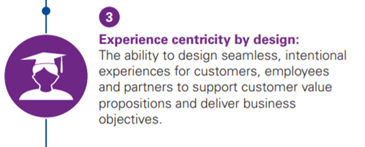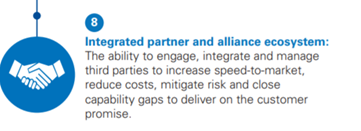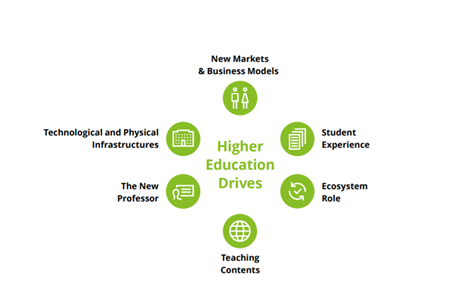A couple of weeks ago, David Kernohan at WonkHE, wrote a wonderfully cutting little piece about a new Ernst & Young report calling for a “fundamental re-think” of higher education, and how it seemed to rely on millenarian scenarios in order to sell what was actually a fairly modest call for institutions to maybe improve their IT capabilities. It inspired me to think a bit more about how the rest of the big consulting groups – Deloitte, KPMG, Ernst & Young, PricewaterhouseCoopers (PWC), McKinsey and Bain Capital – approach higher education through such pieces.
Consulting companies regularly publish papers for free in order to give potential customers an idea of their approach to and insights into certain problems that they think matter to their customers. In the business, this is known as “exercising thought leadership”. Here at HESA Towers, we do the same thing with our free publications, or things like The State of Post-Secondary Education in Canada, and indeed this blog itself (the main difference being that at HESA Towers the phrase “thought leader” is strictly verboten on account of it being deeply embarrassing if not outright nauseating). Basically, they break their work down into occasional thought pieces on specific issues, like change-management, or student success, and big set-piece “THIS IS THE FUTURE OF HIGHER EDUCATION” are supposed to demonstrate their commanding knowledge of the sector.
Anyways, I checked through a whole bunch of these on the weekend, and to cut a long story short my conclusion is this: the big consulting companies rely less than expected on the apocalyptic stuff that I thought, but when it gets right down to it, they are all remarkably similar. And boring. To be fair, this is in part because so much of these companies’ recent work seems to be COVID-related, but even if you separate that stuff out, these companies are operating in a remarkably narrow range. And as for having a commanding knowledge of the sector, I would argue that the foci of most of these consulting firms reveals no more that one would get from faithfully reading Inside Higher Education or World University News for a bit.
What all the consultants agree on is that higher education is at some kind of “inflection point”, the gust of which is that higher education is becoming financially untenable. They have of course been saying this for over a decade. Compare for instance these two Bain pieces from 2012 and 2021 – give or take a Covid reference, there’s really not a lot of difference here. An in some ways that’s OK, because Bain’s shtick is a little narrower that the others. Never ones to get into things like the social purpose of education, or things like student success, Bain is always focused on two things: helping universities spend less/smarter and helping them earn more money. Bain are the keep-it-boring consultants: buy for a dollar, sell for two. The shtick never gets old.
KPMG’s 2020 piece The Future of Higher Education in a Disruptive World, on the other hand, deserves every last eyeroll that title provokes. The evidence that higher education is being disrupted mostly boils down to “international students aren’t coming back” (which isn’t true, and some of us were saying so in 2020), and some entirely evidence-free opining on remote education being the future because it’s “The Age of the Customer”. Given that there has not been a single survey on student preferences anywhere in the world throughout the pandemic which suggests anything other than that a large majority students want to be on-campus as soon as it is safe to do so, I am not sure how these two things can be reconciled, but whatever.
Broadly, KPMG’s pitch is that change is hard in universities, and KPMG has an eight-part framework for “connected enterprises” (a catch phrase they use in both for-profit and non-profit enterprises alike) which universities can apply to their own situation and transform themselves into success. Or at least they could if the 8 parts were in any way comprehensible. For instance, what does this mean in a higher education setting?

Or this?

But enough about KPMG. On to E&Y, which by rights should have the best higher education practice offering since they bought a genuinely good higher education consultancy (Parthenon) about a decade ago and integrated it into their own offerings. But they do have a way of stating their case in extreme terms. Here’s a piece which talks about “peak higher education” in Oceania and then asks a bunch of questions that I feel felt transgressive to the people who wrote them but actually are just banal (“what if the cost of learning is driven down to zero”…ever heard of OERs, guys?) or straight out inane (“what if commercialized research funds university operations”…there simply isn’t enough corporate R&D to go around even if firms were wild enough to outsource it all and universities were in any way suited to do it). E&Y papers are definitely the place to get the frisson of big-picture thinking, but translating this into reasonable thoughts about medium-term trends seems a bit beyond them.
Now for Deloitte, which long-term readers know is my favourite consultancy. Well, it too, has produced a pamphlet outlining its thought-leadership and managed to produce something absolutely, unfathomably terrible. Not only is it clumsy as a sales pitch, too frequently mixing what passes for expertise with crude, naked “HIRE US” pitches, but also it sets out its framework of “drivers for change” without actually spelling out their one key assumption, which is that we’re all going to be doing a lot more on-line education in the future. So, when you first see this:

you quite naturally wonder what in the hell they are talking about with respect to teaching contents, new professors, etc. It’s only a page later when you realize they’ve simply assumed everyone is going to be massively more online than they currently are.
The PricewaterhouseCooper 2021 document Perspectives in Higher Education is probably the least insightful of the bunch. It tells the reader that Mental Health is a really big thing on campus these days. Also, diversity and inclusion! No idea why anyone would hire them based on weak stuff like this.
I was pleasantly surprised by the quality of McKinsey’s Reimagining Higher Education in the United States. Unburdened by ludicrous graphics, it’s a simple re-statement of a number of pieces of conventional wisdom followed by ways the conventional wisdom might be re-thought. Sure, like the others it is very big on “online as the future”, but at least it challenges the idea that reputation equals rankings, and that finding relevance might be as important as gaining reputation. As insights go, this isn’t huge, but in a field of banalities, it is a noticeable point of difference.
Maybe the one thing that is most startling in nearly of these reports (Bain is a welcome exception) is how higher education institutions are treated as an undifferentiated mass. It’s as if the big consulting companies believe that institutional histories, sizes, missions can be waved away and simple, cookie-cutter solutions can be implemented across any of them. It’s most noticeable in the talk about online education (yes, it will be more common, no, not all institutions would be well-advised to make big investments in this area). And with that minor McKinsey exception, they are all remarkably silent on the purpose(s) of higher education and how to achieve those better.
In short: a few of the big consulting groups probably have some useful insights on how universities can spend their money efficiently, and occasionally, that’s something worth paying for. But thinking they can “future-proof” (a disturbingly common verb) institutions seems decidedly optimistic: what passes as insight is too often just weak, or unjustifiably tech-optimist or both.
Caveat emptor, etc.

 Tweet this post
Tweet this post

This is entertaining and insightful. Thanks. Too many big management consulting firms talking a good game about disruption, digital transformation, etc. and bringing little or no higher education expertise or recognition of the diversity of institutions and contexts.
Thank you. I enjoyed this. It always feels weird working for a university that is consistently reluctant to spend small amounts of (generally very good) HE consultantcy from actual HE specialists, but quite happy to chuck much larger sums at big consultants who churn out the same standard report, complete with annoying graphics, they’ve hawked around every other HEI (forgetting to edit and replace all of the references with embarrassing frequency).
Yowch, that is some mental-health-jargon-vacuousness on the PWC end.
As a former student at an Ontario college who has mental illness, allow me to hazard a guess as to why things are so very, very bad on this front.
In a word, postsecondary institutions… don’t want to do mental health services. Perhaps they ought not be expected to! I really don’t know. But in any case, they are *extraordinarily* bad at it.
This is, I submit, in large part because they are even more prey to vacuous “thought leadership” nonsense here than other places, plus plenty of “cost cutting” jargon (though never leading to any actual efficiencies, heavens no, that would require occasional toning down of the paternalism and crisis-talk), and general hand wringing that ultimately serves nobody, especially students.
Add to that baked-in institutional rigidness when you as a student “consumer” refuse to comply, or when you can’t, due to e.g. neurodivergence… and it leads to some, ah, inefficiencies.
Case in point: When seeking counselling at my Ontario college (at the behest of well meaning people around me – I liked them enough to try it but wouldn’t have gone on my own), I stated up front upon intake that a certain therapeutic technique absolutely does not work for me, and if undergoing said technique was going to be required in order to access their services, everyone involved would be much better off if I simply left, which I was more than willing to do. (The technique: CBT, if anyone is following along at home)
What did the poor counsellor at my hapless Ontario college proceed to do? Why, nothing less than to use said technique – the only one they had been trained in, the poor dear! due to many a “thought leader” push I might add – to try and pull the therapeutic equivalent of, “no, no, PLEASE, say it ain’t so.”
Now I am old (cough, a mature student) and have been around the block and knew enough to stomp out of the zoom room at this point. And since as our thought leader friends remind us, “the availability of resources to serve students with mental health conditions remains a pain point,” you would think I would be lauded for saving them precious $$ at this point, by knowing my own needs and boundaries and standing up for them – but no. No, no, a *thousand* times no. They were… shall we say… extremely other than pleased.
Now, mental health services are exquisitely f***ed throughout this province, but this encounter stands above others I’ve had in so many ways. And so I can only imagine that “as colleges and universities move beyond the pandemic” to the “strategic business partnerships” which our PWC friends so breathlessly foretell, the mental gymnastics will continue. And nobody will win, especially not students.
Perhaps they should stop doing it entirely. Or do it in an entirely different way.
Perhaps they should stop with the jargon and sugarcoating (which ultimately covers for bland stigma, and prejudice, little else), and pretending, endless pretending.
Perhaps.